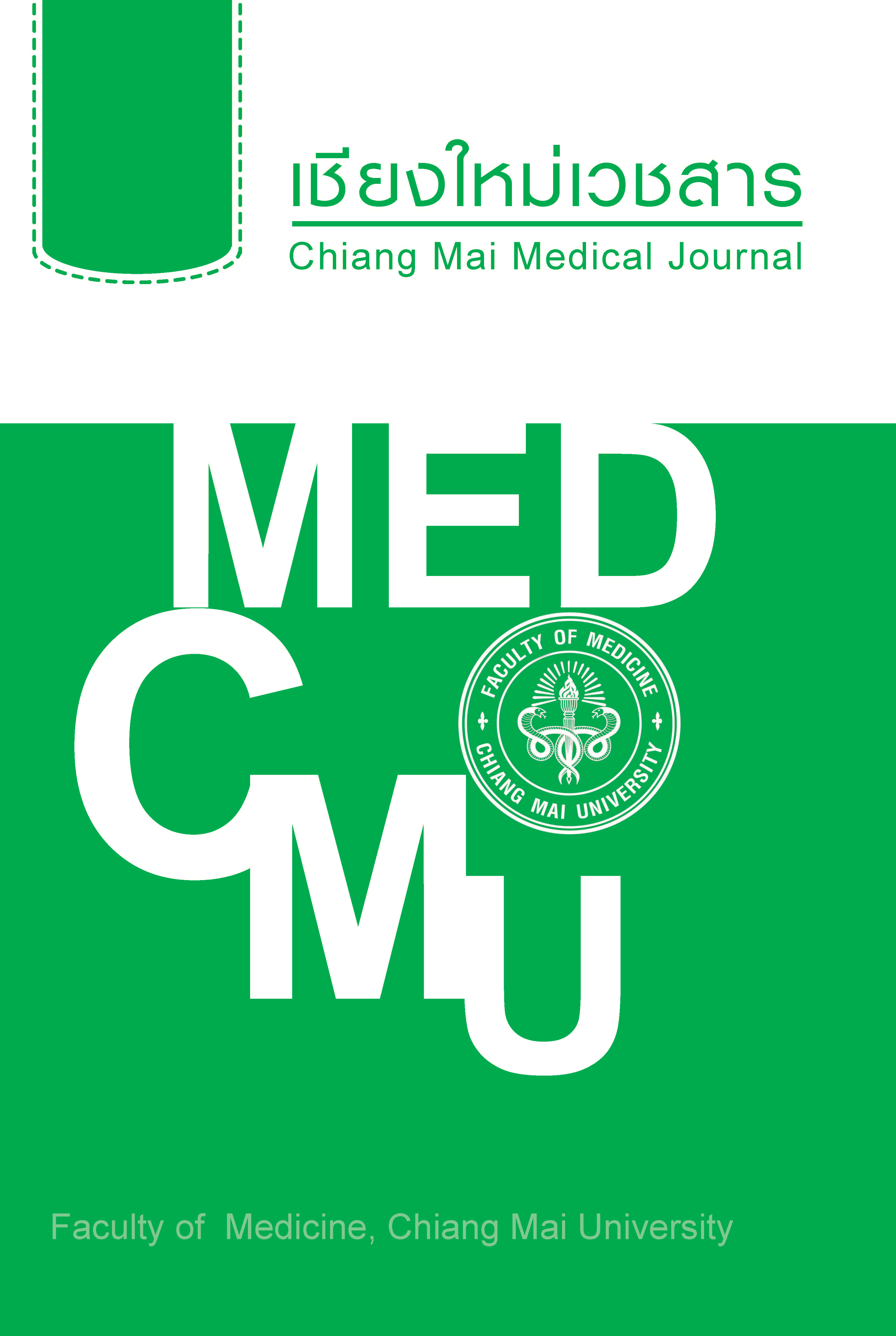Metabolic syndrome in patients with major depressive disorder: A study of one year incidence and associated factors
Keywords:
metabolic, depression, incidence, factorsAbstract
Objective To examine the one year incidence of metabolic syndrome and factors associated with major depressive disorder.
Methods Patients who had came for treatment of major depressive disorder (MDD) at Maharaj Nakorn Chiang Mai Hospital were screened using the metabolic syndrome criteria proposed by the American Heart Association/National Heart, Lung, and Blood Institute (updated ATPIII). Subjects who did not meet the criteria of metabolic syndrome were screened again at a one year follow-up. Age, history of atypical antipsychotic medication usage, duration of illness, severity of illness, and family history of metabolic syndrome were assessed as factors potentially associated with the metabolic syndrome. Data was analyzed using, standard deviation, student t-test, chi-square test, and Fisher’s exact test and is presented as percentages and means.
Results One hundred and forty subjects were recruited of whom 53 were excluded because they already had metabolic syndrome. After one year, 77 of the 87 returned for a follow-up visit and were again screened for metabolic syndrome. The one-year incidence of metabolic syndrome, evaluated according to ATP III criteria, was 16.9% (13 subjects). Both Baseline triglyceride and HDL levels were significantly associated with metabolic syndrome in patients with major depressive disorder (p ≤0.001). Age, history of atypical antipsychotic medication usage, duration of illness, severity of illness, and family history of metabolic disorders were not found to be associated with metabolic syndrome.
Conclusions MDD patients are likely to have or to develop metabolic syndrome. These findings emphasize the importance of assessing and monitoring metabolic syndrome in MDD patients, especially patients who have both high triglyceride and HDL levels.
References
2. Saari KM, Lindeman SM, Viilo KM, Isohanni MK, Jarvelin MR, Lauren LH, et al. A 4-fold risk of metabolic syndrome in patients with schizophrenia: the Northern Finland 1966 birth cohort study. J. Clin. Psychiatry. 2005;66:559-63.
3. Heiskanen TH, Niskanen LK, Hintikka JJ, Koivumaa-Honkanen HT, Honkalampi KM, Haatainen KM, et al. Metabolic syndrome and depression: a cross-sectional analysis. J Clin Psychiatry. 2006; 67:1422-7
4. Hat NH, Shahrul Azhar MH, Chong LL, Ee WS, Amirah R, Hazli Z, Nik Ruzyanei NJ. Factors associated with metabolic syndrome among psychiatric outpatients with major depressive disorder.Malaysian J of Psychiat. 2011;20:2
5. Cameron AJ, Shaw JE, Zimmet PZ, The metabolic syndrome: prevalence in worldwide populations. Endocrinol Metab Clin North Am. 2004;33: 351-75.
6. Hwang JH, Kam S, Shin JY, Kim JY, Lee KE, Kwon GH, et al. Incidence of metabolic syndrome and relative importance of five components as a predictor of metabolic syndrome: 5-year follow-up study in Korea. J Korean Med Sci. 2013;28:1768-73. doi: 10.3346/jkms.2013.28.12.1768. Epub 2013 Nov 26.
7. Hadaegh F, Hasheminia M, Lotfaliany M, Mohebi R, Azizi F, Tohidi M. Incidence of metabolic syndrome over 9 years follow-up; the importance of sex differences in the role of insulin resistance and other risk factors. PLoS One. 2013 Sep 27;8: e76304. doi: 10.1371/journal.pone.0076304. eCollection 2013.
8. Santos AC, Severo M, Barros H. Incidence and risk factors for the metabolic syndrome in an urban South European population. Prev Med. 2010; 50:99-105.
9. Goethe JW,BonnieL.Szarek,Kblankand CF Caley.Metabolic syndrome in patients with major depressive disorder, associated risk factor. Psychiatric Times. 2009;26:1.
Downloads
Published
How to Cite
Issue
Section
License

This work is licensed under a Creative Commons Attribution-NonCommercial-NoDerivatives 4.0 International License.










